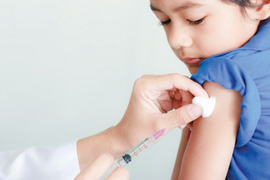Your body has a natural defence system against harmful organisms such as bacteria and viruses. When these germs invade the body, your immune system makes antibodies that help destroy them. The next time you are exposed to the same infection, your body automatically recognises it and produces the same antibodies to destroy it!
Vaccinations work in pretty much the same way. A vaccination shot contains a very small and safe amount of the virus or bacteria, which has been killed or weakened. This helps your body learn to recognise and attack the infection if you contract it later on in life. However, the chances of getting the infection after vaccination are very much reduced, and if you do get it, the infection is often mild.
Fight Pneumococcus!
Pneumococcal disease is caused by Streptococcus pneumoniae, commonly known as pneumococcus. It attacks various parts of the body, causing serious illnesses in both children and adults. There are generally two types of pneumococcal diseases: invasive diseases and non-invasive diseases.
Invasive diseases are more serious and occur within a major organ, or the blood, and include:
- Pneumonia – Occurs when pneumococcus attacks the lungs.
- Bacteraemia – Occurs when the bacteria spreads and circulates in blood.
- Meningitis – An extremely serious condition whereby the brain covering and spinal cord becomes inflamed.
Both bacteraemia and meningitis are deadly diseases that can kill within hours, and babies and toddlers fall into the high-risk groups of contracting these diseases!
Non-invasive diseases on the other hand, occur outside major organs and the blood. These include:
- Otitis media – An infection of the middle ear.
- Sinusitis – Inflammation of the sinuses.
These diseases are much less severe compared to bacteraemia and meningitis; however, they can still cause serious complications if they’re not detected and treated early.
Prevent with vaccination
There are more than 90 known pneumococcal serotypes, with 13 common ones that cause 80-92% of invasive diseases in young children all over the world. Pneumococcal vaccination is one of the best ways of preventing invasive pneumococcal diseases.
Pneumococcal conjugate vaccines (PCV) protect infants and young children against pneumococcal disease. Young children below two years old are at highest risk of being infected with the pneumococcus. This risk is especially higher if the child is enrolled in a day care or nursery where the infection passes from one child to another via air droplets from sneezing or coughing. Immunisation can begin as early as six weeks of life. The added benefit of the vaccine is that it eradicates the bacteria from the nasopahrynx (back of the thorat and nose) thus preventing its spread to other children and adults. This is known as the indirect benefits of the vaccine, also called herd immunity.
Weighing the risks
Vaccination is the principal means of preventing many diseases, therefore avoiding unnecessary illness, disability and death. Some parents may worry about side effects that may occur from vaccination, but in fact, vaccination remains the best defence against diseases, and its benefits far outweigh its risks.
The most usual side effects from vaccinations may just be redness or swelling at the injection site, which soon goes away. In very rare cases, some may experience allergic reactions, which can be treated effectively when taken care of promptly.
The benefits of vaccination cannot be seen immediately; but with vaccination, you can be quite sure that your child does not contract pneumococcal disease. Though vaccination is not 100% effective in all children, it is far better to be vaccinated than not. They are the best guard against diseases that have the potential to kill or even disable.






Comments